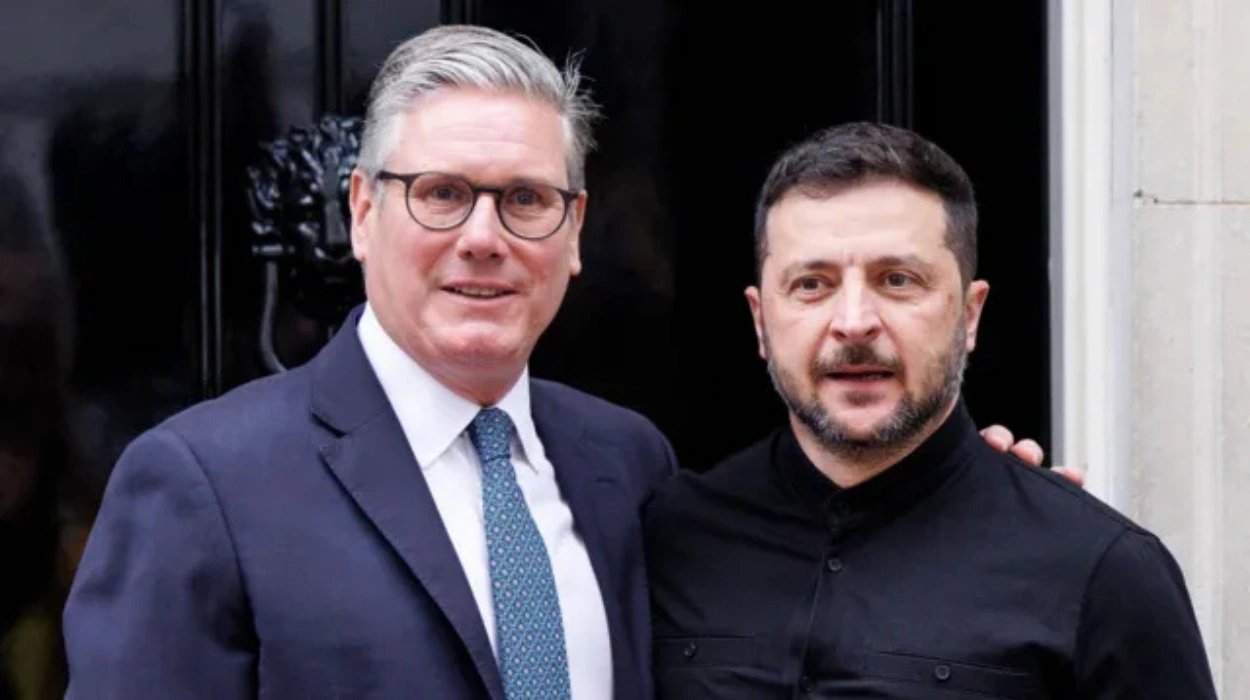UK (Parliament Politics Magazine) – UK PM Keir Starmer praised US President Donald Trump’s Alaska talks with Putin, saying it brought the world closer to ending Russia’s war in Ukraine.
As reported by The Independent, Sir Keir Starmer said President Trump’s Alaska summit with Russian President Putin has brought the world closer to halting Russia’s war in Ukraine.
What did Sir Keir Starmer say about Trump’s Ukraine peace efforts?
Sir Keir Starmer, on Monday, welcomed US President Donald Trump’s pledge of “robust security guarantees” for Ukraine but stressed that peace progress must involve Ukrainian President Zelensky in talks.
He said,
“[Donald Trump’s] leadership in pursuit of an end to the killing should be commended.”
Following the Alaska talks, Mr Starmer and President Zelensky joined US President Donald Trump and European leaders from Italy, France, Finland, Germany, Poland, and NATO officials in a call.
The British prime minister said,
“President Trump’s efforts have brought us closer than ever before to ending Russia’s illegal war in Ukraine. His leadership in pursuit of an end to the killing should be commended.”
He stated,
“While progress has been made, the next step must be further talks involving President Zelenskyy.”
Mr Starmer said,
“I welcome the openness of the United States, alongside Europe, to provide robust security guarantees to Ukraine as part of any deal. This is important progress and will be crucial in deterring Putin from coming back for more.”
He added,
“In the meantime, until he stops his barbaric assault, we will keep tightening the screws on his war machine with even more sanctions, which have already had a punishing impact on the Russian economy and its people.”
What did Trump and Putin say after Alaska talks?
Early Saturday, the US and Russian leaders confirmed no deal, with Mr Trump saying key issues remain unresolved. He called the meeting with Mr Putin “extremely productive.”
Mr Trump added,
“There’s no deal until there’s a deal. I will call up NATO… I’ll, of course, call up [Ukraine’s] president Zelenskyy and tell him about today’s meeting. It’s ultimately up to them.”
Mr Putin warned European leaders against undermining progress with backroom deals.
He said,
“I have every reason to believe that moving down this path we can come – and the sooner the better – to the end of the conflict in Ukraine.”
The Russian president described the Alaska talks as “constructive” and hinted at another meeting in Moscow, raising concerns over potential US concessions.
European leaders’ views on Ukraine in their joint statement
European leaders, including French President Emmanuel Macron, Italian Prime Minister Giorgia Meloni, German Chancellor Friedrich Merz, and European Commission President Ursula von der Leyen, said Ukraine should face no restrictions on its forces or foreign cooperation.
In another joint statement, they said,
“We share the conviction that a diplomatic solution must protect Ukraine’s and Europe’s vital security interests.”
They added,
“Ukraine has the freedom of choice over its own destiny. Meaningful negotiations can only take place in the context of a ceasefire or reduction of hostilities. The path to peace in Ukraine cannot be decided without Ukraine. We remain committed to the principle that international borders must not be changed by force. The current line of contact should be the starting point of negotiations.”
What did Orysia Lutsevych say about Trump’s comments on Russia?
Orysia Lutsevych, who leads the Ukraine Forum at Chatham House, warned that Trump’s praising Russia as a “great country” deepens divisions.
She said his comments about a strong mutual understanding between the two parties represent a “further fissure in the already shaky Transatlantic alliance,” which Russia aims to exploit.
Keir Giles’ stance on the risks from the Trump-Zelensky summit
Keir Giles, who serves as an associate fellow at Chatham House’s Russia and Eurasia Programme, highlighted “two dangers” from the summit.
According to him, the first risk is that President Zelensky may be seen by President Trump as a “softer target” for pressure. This, he warned, could allow Trump to “once again try to strongarm Zelensky into compromising the future of his country.”
Mr Giles said the second risk is that European leaders might think the crisis is over. He warned this could make them complacent after their rush to speak to President Trump ahead of the summit.
What did Dr Neil Melvin say about Putin’s goals at the Alaska summit?
Dr Neil Melvin, director of international security at the Royal United Services Institute, said President Putin may view the summit outcome as “mission accomplished.”
He added,
“Vladimir Putin came to the Alaska summit with the principal goal of stalling any pressure on Russia to end the war.”
What did Volodymyr Zelenskyy say about his upcoming meeting with Trump?
Volodymyr Zelenskyy confirmed a detailed call discussion with US President Donald Trump on Saturday, coming after Trump’s Alaska meeting with Putin.
He said,
“This call lasted for more than an hour and a half, including about an hour of our bilateral conversation with President Trump.”
Mr Zelensky stated,
“Ukraine reaffirms its readiness to work with maximum effort to achieve peace. We support President Trump’s proposal for a trilateral meeting between Ukraine, the USA, and Russia. Ukraine emphasises that key issues can be discussed at the level of leaders, and a trilateral format is suitable for this.”
He added,
“On Monday, I will meet with President Trump in Washington, D.C., to discuss all of the details regarding ending the killing and the war. I am grateful for the invitation.”
In a statement after meeting with Sir Keir Starmer in Downing Street on Saturday, the Ukrainian president stated,
“We continue to coordinate our positions. We discussed expectations for the meeting in Alaska and possible prospects. We also discussed in considerable detail the security guarantees that can make peace truly durable if the United States succeeds in pressing Russia to stop the killings and engage in genuine, substantive diplomacy.”


